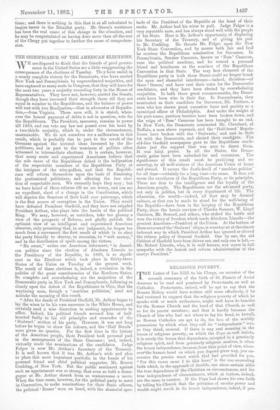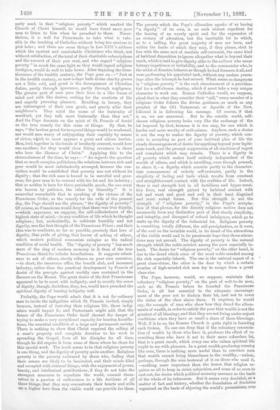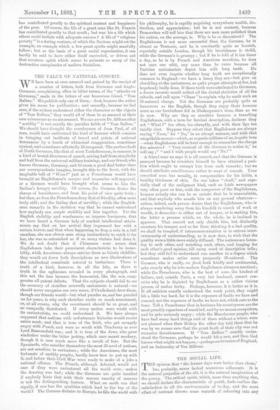RELIGIOUS POVERTY.
THE Letter of Leo XIII, to his Clergy, on occasion of the seventh centenary of the birth of St. Francis of Assisi deserves to be read and pondered by Protestants, as well as Catholics. Protestants, indeed, will be apt to say that the Roman Bishop would have written still more effectively, if he had ventured to suggest that the religious poverty of which he speaks with so much enthusiasm, might well have its benefits. for the Roman Church and the head of that Church, as well as for its poorer members ; and. that it hardly becomes the Church of him who had not where to lay his head, to bewail, as Roman Catholics are apt to do, the loss of the worldly possessions by which what they call its " independence " was, as they think, secured. If there is any real meaning in the lesson of religious poverty, on which the Pope so well insists, it is surely the lesson that dependence, accepted in a genuinely religious spirit, and from genuinely religious motives, is often the truest independence, because, from that point of view, when- everthe human hand on which you depend gives way, yen en- counter the precise want which God had provided for you. "For this cause came I to this hour," is the one overruling faith which, in the approach of trouble, can alone sustain alike the true dependence of the Christian on circumstances, and his true independence of circumstances, which at bottom, indeed, are the same in. essence. If the Pope had shown his own faith by telling his Church that the privation of secular power and wealth might result, in its truest independence, indeed, if pro; perly used, in that "religious poverty" which marked the Church of Christ himself, he would have found more poor men to listen to him when he preached to them. Never- theless, it is well for Protestants to take what is valu- able in the teaching of Catholics without being too anxious to pick holes ; and there are some things in Leo XIII.'s address which the opulent and comfortable Christians who think, not without satisfaction, of the total of their charitable subscriptions and the amount of their pew rent, and who regard "religious poverty" in much the same light as they would regard religious irreligion, would do well to take home. After depicting the licen- tiousness of the twelfth century, the Pope goes on :—" Just as in the twelfth century, so now-a-days bath divine charity grown not a little cold, and great is the derangement of Christian duties, partly through ignorance, partly through negligence. The greater part of men pass their lives in a like frame of mind and with like desires, seeking for the comforts of life and eagerly pursuing pleasure. Revelling in luxury, they are extravagant of their own goods, and greedy after their neighbour's. They extol the name of the fraternity of mankind, yet they talk more fraternally than they act." And the Pope descants on the spirit of St. Francis of Assisi as the true remedy for this state of things. By that, he says, "the lawless greed for temporal things would be weakened, nor would men weary of subjugating their cupidity by means of virtue, vallich to most appears a great and odious burden. Men, knit together in the bonds of brotherly concord, would love one another; for they would show fitting reverence to those who bore the likeness of Christ." Applying this to the circumstances of the time, he says :—" As regards the question that so much occupies politicians, the relations between rich and poor would be most satisfactorily arranged, because the con- viction would be established that poverty was not without its dignity ; that the rich man is bound to be merciful and gene- rous, the poor man to be content with his lot and his industry ; that as neither is born for these perishable goods, the one must win heaven by patience, the other by liberality." It is somewhat remarkable that in speaking of the virtues of the Franciscan Order, as the remedy for the evils of the present day, the Pope should use the phrase, "the dignity of poverty." Of course, no Franciscan would deny that there was true dignity, —which expresses, we suppose, the self-collectedness of the highest state of mind,—in any condition of life which he thought religious ; but, undoubtedly, to cultivate humility and not dignity, was the first thought of the Franciscan Friars ; and their idea was to eradicate, as far as possible, precisely that love of dignity, that pride of giving, that horror of asking of others, which modern political economists eulogise as the radical condition of social health. The "dignity of poverty" has much more of the ring of modern economy in it than of the true Franciscan thirst for infinite humiliations. It suggests reluct- ance to ask of others, sturdy reliance on your own resources, —in short, the insurance office, the benefit club, and incessant industry, rather than the practical development by Francis of Assisi of the precepts against worldly care contained in the Sermon on the Mount. The great desire of the first Franciscans appeared to be to meet with indignity, and to crucify the sense of dignity, though, doubtless, they, too, would have preached the spiritual dignity of bearing indignity well.
Probably, the Pope would admit that it is not for ordinary men to invite the indignities which St. Franois invited, simply because, instead of fostering their religious life, those iudig- nities would impair it ; and Protestants might add, that the future of the Franciscan Order itself showed the danger of trying to make a very exceptional capacity for bearing humilia- tions, the essential condition of a large and permanent society. There is nothing to show that Christ required the selling of a man's property and complete devotion to his work in spreading the Gospel, from all his disciples for all time, though he did require it from some of those whom he chose for this special work. The truth seems to be that religious poverty is one thing, and the dignity of poverty quite another. Religious poverty is the poverty embraced by those who, feeling that their senses are likely to be fascinated, and their minds filled and occupied with external things, with the enjoyment of power, beauty, and intellectual gratifications, if they do not take the strongest measures to repudiate the world, commit them- selves in a passion of enthusiasm to a life destitute of all these things, that they may concentrate their hearts and wills on a higher love than the visible world can provide for them. The poverty which the Pope's allocution speaks of as having "a dignity" of its own, is no such violent expedient for the taming of an unruly spirit and for the expression of an eestacy of adoration, but the inevitable lot to which, as to a calling, the great majority of men are born, and within the limits of which they may, if they please, elect to live with the same sort of resolute self-restraint, the same kind of habitual disposition to ignore altogether what is beyond their reach, which is said to give dignity alike to the sufferer who never betrays impatience or irritability, and to the commander who, in the midst of disaster, behaves as though he had foreseen it all, and were performing his appointed task, without any useless yearn- ings after the triumph he had missed. What seems so dangerous in "religious poverty" is the rash abandonment of a providen- tial for a self-chosen destiny, which it must take a very unique character to work out. Roman Catholics would, we suppose, plead that in what they consider their "call," every member of a religious Order follows the divine guidance, as much as any prophet of the Old Testament, or Apostle of the New, followed it in delivering his message. Of course, if that is so, we are answered. But to the outside world, self- chosen religious poverty looks very like the exchange of the lot imposed by God, because it is too easy, for one which is harder and more worthy of enthusiasm. Anyhow, such a choice is not the way to realise the dignity of poverty, which con- sists in accepting as part of your habitual plan of life the steady discouragement of desire for anything beyond your legiti- mate reach, and the prompt suppression of all emotions of regret and complaint which may remain. There is a dignity in all poverty which makes itself entirely independent of the wealth of others, and which is unwilling, even though pressed, to share it,—a dignity which consists partly in the character- istic consequences of orderly self-restraint, partly in the simplicity of feeling and taste which results from constant and straightforward contact with the realities of life. Indeed, there is real strength lost in all fastidious and hyper-sensi- tive lives, real strength gained by habitual contact with toil and want and good and evil in their least disguised and most naked forms. But this strength is not the strength of " religious poverty," in the Pope's accepta- tion of that phrase, for the directly religious motive dm not necessarily form any distinctive part of that sturdy simplicity, and integrity, and disregard of refined indulgence, which go to make up the dignity of the industrial lot, Religious poverty is something totally different, the self-precipitation, as it were, of the soul on the invisible world, in its dread of the attractions of the visible world and in its passionate hope that those attrac-
tions may not prevail. The dignity of poverty is the natural strength which the noble-minded among the poor especially in-
herit. The desire for "religions poverty," on the other hand, is due to the dread which some of the most noble-minded among the rich especially inherit. The one is the natural aspect of a great class-virtue, the other is the door by which a certain number of high-minded rich men try to escape from a great class-vice.
The Pope, however, would, we suppose, maintain that voluntary "religious poverty," on the part of well-to-do men, such as St. Francis before he founded the Franciscan Order, is all but essential to the adequate encourage- ment of the poor not to disdain their lot, and not to covet the riches of the class above them. It requires, he would say, the example of men who show how they dread the allure- ments of wealth, in order to satisfy the poor that wealth is not the greatest of all blessings, and that they are not living under unjust conditions when they have so small a share of these blessings. Well, if it be so, the Roman Church is quite right in founding such Orders. No one can deny that if the voluntary renuncia- tion of wealth by those who have it, produces the effect of re- conciling those who have it not to their more colourless lot, that is a great result, which every one who values spiritual life ought to see with pleasure. In a great wealth-producing country like ours, there is nothing more useful than to convince men that wealth cannot bring blessedness to the wealthy,—unless, perhaps, through the wise bestowal of it on those who need it, —nothing more important than the lesson that religion re- quires us all to keep in strict subjection, and some of us even to cast out, the desire which political economy assumes as the basis of the whole of its inferences. But it seems very doubtful, as a
matter of fact and history, whether the foundation of Societies organised on the basis of abjuring the world's possessions, ever
has contributed greatly to the spiritual content and happiness of the poor. Of course, the life of a great man like St. Francis has contributed greatly to that result ; but was his a life which others could imitate with adequate success? A life of "religious poverty " is a daring venture, of which the Saviour might set the example, an example which a few great spirits might manfully follow; but as the basis of a great social organisation, it can hardly be said to have either itself succeeded, or driven out that covetous spirit which seems to animate so many of the destructive conspiracies of modern Socialism.








































 Previous page
Previous page